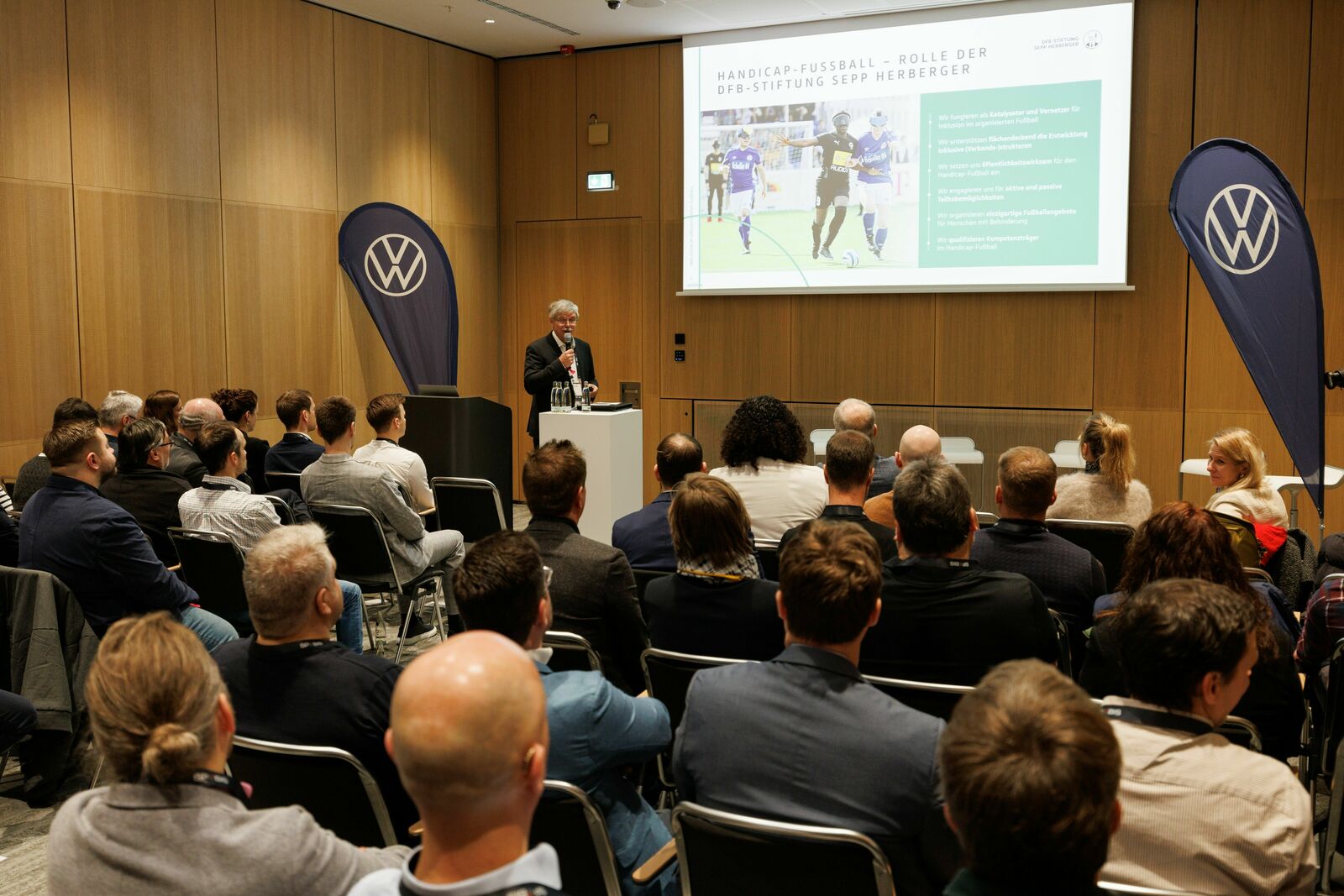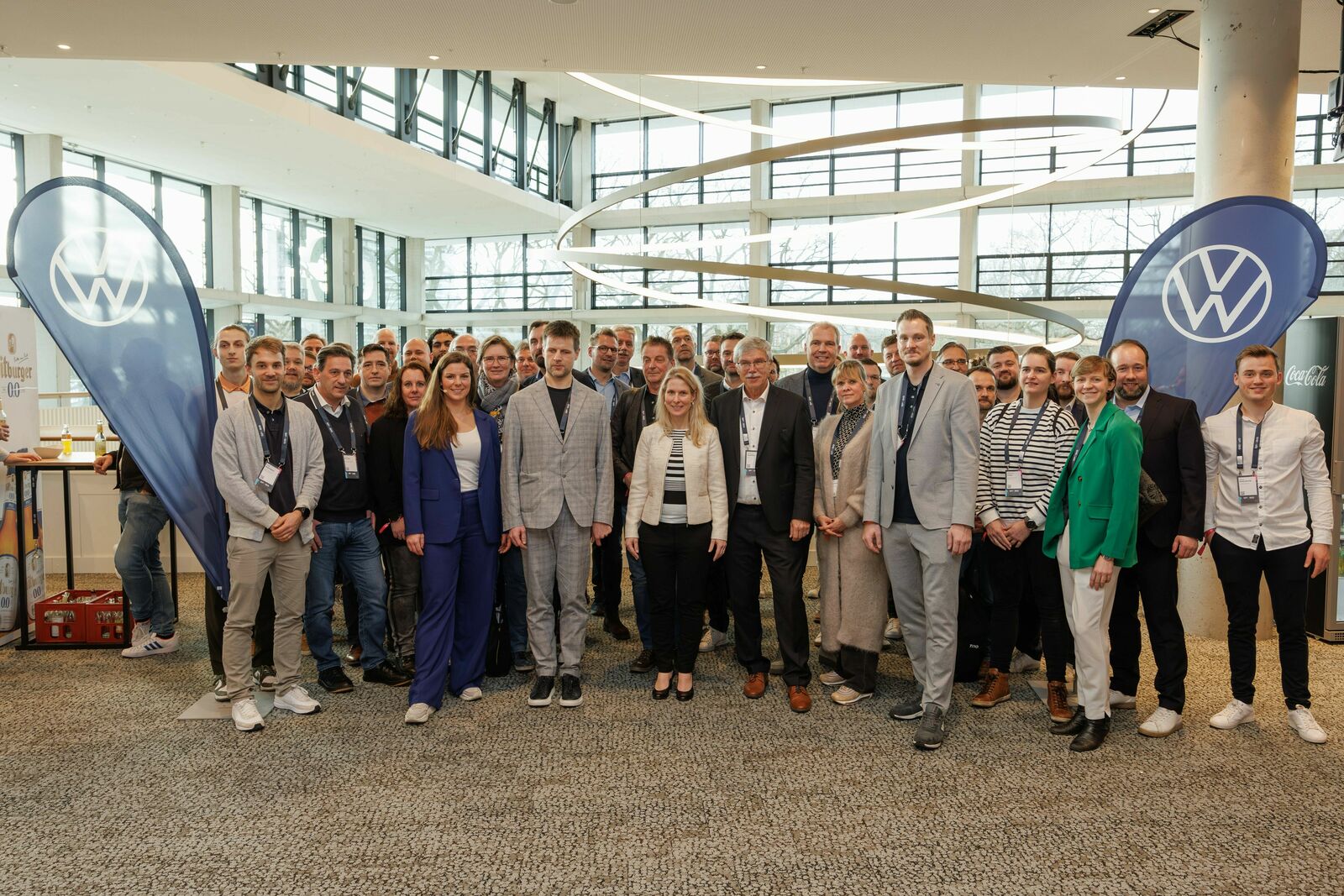- ‘Inclusion in football’ workshop at Europe’s largest sports business congress provides important impetus.
- DFB Vice President Ralph-Uwe Schaffert announces more visibility for inclusive football at UEFA EURO 2024.
- Sandra Waidelich, CMO Volkswagen Commercial Vehicles: ‘We have a social stance and we want to communicate this to the outside world.’
Inclusion, diversity and football – these were the three major topics discussed at the SPOBIS Conference in Hamburg. For the fifth time, the German Football Association (DFB) and its mobility partner Volkswagen organised a programme specially tailored to the 21 DFB regional associations for the largest sports business congress in Europe. Speakers at the ‘Inclusion in Football’ workshop included DFB Vice President Ralph-Uwe Schaffert, HSV President Marcell Jansen, the record-breaking international player of the national Blind Football team, Alexander Fangmann, and Sandra Waidelich, Head of Marketing & Sales Experience at Volkswagen Commercial Vehicles.
Inga Grabow formulated one of the most memorable sentences of the day in Hall 6 of the Congress Centre Hamburg (CCH): ‘Everyone can’t do something. That’s why we’re all the same.’ Together with her husband Marcel Grabow, she organises and trains the teams of the Ibbenbürener Kickers, an inclusive football club, on a voluntary basis. Founded four years ago, the club is open to everyone – regardless of age, gender, talent or background, with or without a disability and in colourful mixed teams. ‘For us, it’s about the experience, not the result,’ said Grabow, summarising the core idea of inclusive football to the representatives of the 21 DFB regional associations in attendance.
On that morning at the CCH, the Ibbenbürener Kickers were one of the clubs, alongside SV Werder Bremen, that used the stage at the ‘Inclusion in Football’ workshop initiated by Volkswagen and the German Football Association to give an insight into their work as an inclusive football club.
DFB Vice President Schaffert wants to promote visibility for inclusive football
In his keynote speech on the opportunities and benefits of inclusion in organised football, DFB Vice President Ralph-Uwe Schaffert emphasised just how important this work is for football to develop its integrative power: ‘There are a large number of people with disabilities in Germany, whether physical or mental. It is important for these people to be able to participate in sport. As a major sports association with over seven million members, we in particular must set an example here.’ He believes it to be crucial to look at the topic with a potential-orientated rather than a ‘deficit-orientated view’. A key question could be: ‘What can people who join a club with a disability do even better than people without a disability?’ Even if there are obstacles in everyday club and association life due to personnel, infrastructural or financial situations, attempts should be made to overcome these initial obstacles.
Full house in Hamburg: keynotes, talks and discussions on the opportunities and benefits of inclusion in football.
The Sepp Herberger Foundation, which Schaffert also chairs, exists within the DFB to promote and organise handicap football in Germany and to give it a home in organised sport. Wheelchair, deaf and blind footballers as well as sheltered-workshop- and amputee players can all be found under its umbrella.
The lighthouse projects include the annual Football Inclusion Days, which will be held once again this year from 10 to 12 May at Roncalliplatz in Cologne, in addition to the German Football League for the Blind, which was founded in 2008 and is the only one of its kind in Europe. The UEFA EURO 2024 is also to be used for handicap football, Schaffert revealed in Hamburg: ‘We are planning so-called “inclusion days light” for all host cities in order to reach a wider audience.’
HSV President Jansen: Inclusion not a marketing tool
Professional football could provide a tailwind for more visibility in inclusive football. Marcell Jansen also agreed with this. In the panel discussion ‘The role of Inclusive Football from the Perspective of Professional Clubs, Companies and Associations’, the president of Hamburger SV admitted: ‘As a Bundesliga club, whether in the premier or first division, we could certainly go one better and, for example, increase visibility in the run-up to professional matches.’
In general, the topic of inclusion is becoming increasingly important within the clubs. For example, HSV has been offering amputee football since 2021 and recently included a match day in the West Curve Championship, the championship of HSV fans with over 60 teams. At the same time, however, Jansen warned against using the topic of inclusion for false advertising purposes. When asked whether inclusion contributes to the brand of a professional club, he answered clearly: ‘As a club, you have to have the basic conviction that you are committed to inclusion. This is not a marketing tool, but a self-image.’
A self-determined life for people with disabilities
Volkswagen has also taken up the cause of supporting football in all its diversity, from the grassroots to the top – and underpins this with various communication campaigns, among other things. For example, a social media series on the topic of integration was recently produced under the hashtag #einfußball about the football club Türkiyemspor Berlin 1978. This is exactly what it’s all about, said Sandra Waidelich, Head of Marketing & Sales Experience Volkswagen Commercial Vehicles, during the SPOBIS round table: ‘It doesn’t matter whether they are people with or without disabilities, where they come from, what their sexual orientation is or what their religious beliefs are.’ Her company has ‘a social attitude and we want to convey this to the outside world’.
Together for the future: representatives of the 21 regional football associations discussed inclusion projects.
In addition to the DFB partnership, the Group is therefore also a partner of the Sepp Herberger Foundation and the Football Inclusion Days. ‘We are a mobility provider and want to play our part in enabling people with disabilities to lead a self-determined life,’ emphasised Waidelich.
At the centre of society
Alexander Fangmann brought a different but very important aspect to the debate on inclusive football. In the view of the record-breaking player of the national Blind Football team, clubs and associations should not just ask themselves what they can do to help people with disabilities. Rather, they should consider what happens to a club when members no longer find suitable programmes and leave the club. Because, for example, the fun of sport is lost due to the pressure to perform. Inclusive sport offers a great opportunity not only to attract members, but also to retain them.
In Hamburg, it once again became clear that inclusion and diversity are essential for sustainable success in football. And in business, too.
Volkswagen and DFB at SPOBIS: How inclusion can succeed in organised football

